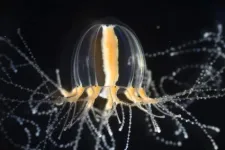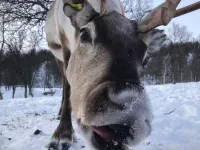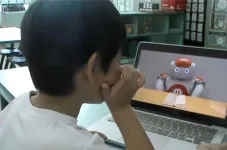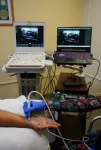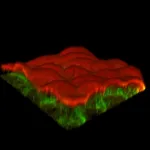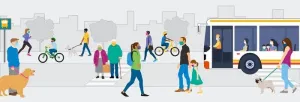(Press-News.org) A new study published today (22 December 2023) in Nature Communications details that markers of brain injury are present in the blood many months after COVID-19 infection, despite inflammation blood tests being normal.
The findings represent a major output from the University of Liverpool and King’s College London led COVID-19 Clinical Neuroscience Study (COVID-CNS) and also involves scientists from the ISARIC4C consortium, The Pandemic Institute and the NIHR BioResource.
Professor Benedict Michael, Principal Investigator and Director of the University of Liverpool’s Infection Neuroscience Laboratory and Honorary Consultant Neurologist, The Walton Centre NHS Foundation Trust said: “During the COVID-19 pandemic it became apparent that neurological complications were occurring in a significant proportion of hospitalised patients and even in those with mild COVID-19 infection. While some neurological ‘symptoms’ were often mild (headache and muscle aches [myalgia]), it became clear that more significant and potentially life-changing new neurological ‘complications’ were occurring, including encephalitis (brain inflammation), seizures, and stroke.”
The COVID-CNS study analysed samples from over 800 patients hospitalised with COVID-19 from across England and Wales, half of whom with new neurological conditions. Here researchers measured brain injury markers, serum inflammatory proteins (cytokines), antibodies, and brain (neuroglial) injury proteins. The analysis of these shows that during the acute phase (when symptoms are developing quickly) there is production of key inflammatory proteins and brain injury markers, but surprisingly on-going robust biomarker evidence of brain (neuroglial) injury in COVID-19 even months after discharge from hospital. Crucially this was more prominent in patients with neurological dysfunction in the acute phase of the illness, and continued in the recovery phase in patients who had suffered acute neurological complications.
The inflammatory markers are associated with abnormal immune responses in the acute phase of the disease, and the researchers suggest that these may represent targets for therapy for COVID-19 and other infections which cause acute brain dysfunction.
“Our study shows that markers of brain injury are present in the blood months after COVID-19, and particularly in those who have had a COVID-19-induced brain complication (e.g. inflammation, or stroke), despite resolution of the inflammatory response in the blood. This suggests the possibility of ongoing inflammation and injury inside the brain itself which may not be detected by blood tests for inflammation,” Professor Michael says.
Head of the Department of Clinical Infection, Microbiology & Immunology, Professor Aras Kadioglu, said: “Liverpool has been at the forefront of research throughout the pandemic and this important new study has identified ongoing brain injury markers in those who developed neurological complications during COVID-19, even months after they had been discharged from hospital. The Liverpool team led by Professor Benedict Michael and colleagues is now working to understand what this means for cognitive function, independence and recovery in those affected.”
Professor Leonie Taams, from King’s College London, said: “It was a great privilege to be part of this important cross-disciplinary research by the COVID-CNS consortium. By bringing together immunology, neurology and infection research, we were able to reveal a number of biomarkers that were associated with the neurological complications of COVID-19. This work may help set the stage for elucidating the possible underlying mechanisms of these complications.”
The full paper, Para-infectious brain injury in COVID-19 persists at follow-up despite attenuated cytokine and autoantibody responses, is available in Nature Communications and online here: https://www.nature.com/articles/s41467-023-42320-4
This study was funded by the Medical Research Council and is supported through the National NIHR BioResource.
END
Ongoing brain injury caused by COVID-19 may not always be detected by routine tests
2023-12-22
ELSE PRESS RELEASES FROM THIS DATE:
Texas A&M team develops polymers that can kill bacteria
2023-12-22
Antibiotic-resistant bacteria have become a rapidly growing threat to public health. Each year, they account for more than 2.8 million infections, according to the U.S. Centers for Disease Control and Prevention. Without new antibiotics, even common injuries and infections harbor the potential to become lethal.
Scientists are now one step closer to eliminating that threat, thanks to a Texas A&M University-led collaboration that has developed a new family of polymers capable of killing bacteria without inducing antibiotic resistance by disrupting the membrane of these microorganisms.
“The new polymers we synthesized could help fight antibiotic ...
How jellyfish regenerate functional tentacles in days
2023-12-22
At about the size of a pinkie nail, the jellyfish species Cladonema can regenerate an amputated tentacle in two to three days — but how? Regenerating functional tissue across species, including salamanders and insects, relies on the ability to form a blastema, a clump of undifferentiated cells that can repair damage and grow into the missing appendage. Jellyfish, along with other cnidarians such as corals and sea anemones, exhibit high regeneration abilities, but how they form the critical blastema has remained a mystery until now.
A research team based in Japan has revealed that stem-like proliferative cells — which are actively growing and dividing but ...
Reindeer sleep while chewing their cud
2023-12-22
Researchers report December 22 in the journal Current Biology that the more time reindeer spend ruminating, the less time they spend in non-rapid eye movement (non-REM) sleep. EEG recordings revealed that reindeer’s brainwaves during rumination resemble the brain waves present during non-REM sleep, and these brainwave patterns suggest that the reindeer are more “rested” after ruminating. The researchers speculate that this multitasking might help reindeer get enough sleep during the summer months, when food is abundant ...
Trends in abdominoplasty: More outpatient surgery and concomitant liposuction
2023-12-22
Waltham — December 22, 2023 —
Abdominoplasty continues to be a safe and effective procedure, with more cases performed on an outpatient basis and increased use of concomitant liposuction, according to a new 16-year analysis in the January issue of Plastic and Reconstructive Surgery®, the official medical journal of the American Society of Plastic Surgeons (ASPS). The journal is published in the Lippincott portfolio by Wolters Kluwer.
"Taking advantage of quality-improvement data submitted by US Board-certified plastic surgeons, our study provides new insight ...
Like kids in a candy store
2023-12-22
Kyoto, Japan – A non-prescription drug abuse crisis in Japan seems only one overdose away. The demand for a particular anti-cough drug has been rising, along with the social impact of its abuse due to its psychosomatic effects.
The ease of obtaining information online about how to acquire over-the-counter medications or OTCs for achieving overdose, however, does not appear to be the real problem.
Now, a study by a team of researchers at Kyoto University suggests that reliable information about OTC abuse needs to be readily available and effectively disseminated.
"We ...
Robots versus humans: Which would children trust more when learning new information?
2023-12-22
In this digital age, children are exposed to overwhelming amounts of information online, some of it unverified and increasingly generated by non-human sources, such as AI-driven language models. As children grow older, the ability to assess a source’s reliability is an important skill in cultivating critical thinking.
Children aged three to five years display selective trust based on the informant’s past accuracy when faced with both humans and robots, according to a study published in the journal Child Development titled, ‘Younger, not older, ...
AI tool aids in screening for nerve disorder
2023-12-22
Researchers at the Indian Institute of Science (IISc), in collaboration with Aster-CMI Hospital, have developed an AI tool that can identify the median nerve in ultrasound videos and detect carpal tunnel syndrome (CTS). The study was published in IEEE Transactions on Ultrasonics, Ferroelectrics, and Frequency Control.
CTS arises when the median nerve, which runs from the forearm into the hand, is compressed at the carpal tunnel part of the wrist, resulting in numbness, tingling or pain. It ...
Big impacts from small changes in cell
2023-12-22
Tiny things matter – for instance, one amino acid can completely alter the architecture of the cell. Researchers at the Universities of Göttingen and Warwick investigated the structure and mechanics of the main component of the cytoskeleton of the cell: a protein known as actin. Actin is found in all living cells where it has a range of important functions – from muscle contraction to cell signalling and cell shape. This protein comes in two different varieties termed “isoforms”, which are known as gamma actin and beta actin. The difference between the two proteins is ...
Jupiter was targeted by exoplanet hunter
2023-12-22
For the first time, an instrument to find planets light years away was used on an object in the Solar System, in a study on Jupiter's winds.
We find ourselves at a time when it has become almost commonplace to discover planets orbiting another star, with more than 5,000 already registered. The first distant worlds to incorporate this list were mainly giant planets, similar to but also very different in many ways from Jupiter and Saturn.
Astrophysicists have already begun to obtain data on the atmospheres of exoplanets, but fundamental ...
Pandemic lessons: Insights into how mobility restrictions affect healthcare costs
2023-12-22
Osaka, Japan - As the world grappled with lockdowns and restrictions brought by the COVID-19 pandemic, researchers at Osaka Metropolitan University conducted an extensive study to elucidate the link between changes in human mobility and the impact on medical costs associated with lifestyle-related diseases.
Dr. Haruka Kato and Professor Atsushi Takizawa of the Graduate School of Human Life and Ecology at Osaka Metropolitan University were concerned by the negative health effects resulting from the restriction of ...
